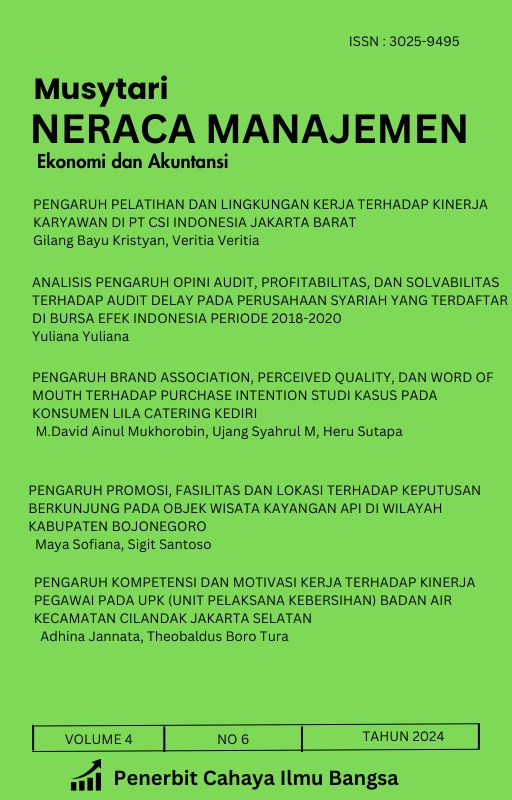PENGARUH KEPEMIMPINAN TRANSAKSIONAL DAN STRES KERJA TERHADAP PERILAKU KERJA INOVATIF MELALUI KEPUASAN KERJA PADA KARYAWAN
Published 2025-06-27
Keywords
- transactional leadership, work stress, job satisfaction, innovative work behavior
How to Cite
Abstract
This study aims to evaluate the influence of Transactional Leadership and Work Stress on Innovation in Work Behavior, with Job Satisfaction as a mediating variable, on Alfamart employees in the Bekasi City area. The research approach used is explanatory with a quantitative method, where data is obtained through a survey of 100 respondents using a questionnaire. Data analysis was carried out using the Partial Least Square (PLS) method using SmartPLS 3 software. The results of the analysis show that Transactional Leadership has a negative influence that is not significant on Innovative Work Behavior, either directly or indirectly through Job Satisfaction as a mediating variable. On the other Satisfaction has been proven to have a positive and significant effect in encouraging innovative work behaviors. In contrast, Work Stress did not show a significant effect on Job Satisfaction or on Innovative Work Behaviors, either directly or through mediation. These findings indicate that increasing employee innovation is more effectively achieved by strengthening job satisfaction levels. This can be done through the creation of a supportive work environment, appreciation of employee contributions, and creating a balance between workload and compensation provided. Focusing on improving job satisfaction seems to be more impactful than just focusing on reducing work stress.
References
- [1] Averina, R. Y., & Widagda, I. G. N. J. A. (2021). PERAN MEDIASI STRES KERJA PADA HUBUNGAN BEBAN KERJA DENGAN KEPUASAN KERJA. Tjyybjb.Ac.Cn, 27(2), 635–637.
- [2] Dami Damianus, A., Fredolin, J. P., Libertine Gertrude, M. R., & Abun Fredolin Julian Libertine Gertrude R, D. P. (2022). Examining the Effect of Transformational and Transactional Leadership Styles on the Innovative Work Behavior: Educational Context To cite this version: Divine Word International Journal of Management and Humanities Examining the Effect of Transformational. Divine Word International Journal of Management and Humanities, 2022(1), 1–21. http://creativecommons.org/licenses/by/4.0/
- [3] Dou, G., Yang, J., Yang, L., Liu, B., & Yuan, Y. (2022). Where there is pressure, there is motivation? The impact of challenge-hindrance stressors on employees’ innovation performance. Frontiers in Psychology, 13(October), 1–15. https://doi.org/10.3389/fpsyg.2022.1020764
- [4] Enok, F. M., & Wijono, S. (2023). Pengaruh Stres Kerja Terhadap Kepuasan Kerja Karyawan Di Pt. Sky Investment Indonesia. Jurnal Talenta Psikologi, 12(1), 30–37. https://jurnal.usahidsolo.ac.id/index.php/JTL/article/view/1344
- [5] Fay, D., Bagotyriute, R., Urbach, T., West, M. A., & Dawson, J. (2019). Differential effects of workplace stressors on innovation: An integrated perspective of cybernetics and coping. International Journal of Stress Management, 26(1), 11–24. https://doi.org/10.1037/str0000081
- [6] GIBSON. (2012). PERILAKU ORGANISASI. Sustainability (Switzerland), 11(1), 1–14. http://scioteca.caf.com/bitstream/handle/123456789/1091/RED2017-Eng-8ene.pdf?sequence=12&isAllowed=y%0Ahttp://dx.doi.org/10.1016/j.regsciurbeco.2008.06.005%0Ahttps://www.researchgate.net/publication/305320484_SISTEM_PEMBETUNGAN_TERPUSAT_STRATEGI_MELESTARI
- [7] Hair, J. F., Sarstedt, M., Hopkins, L., & Kuppelwieser, V. G. (2014). Partial least squares structural equation modeling (PLS-SEM): An emerging tool in business research. European Business Review, 26(2), 106–121. https://doi.org/10.1108/EBR-10-2013-0128
- [8] Imam Ghozali, H. L. (2012). Partial Least Square: Konsep, Teknis Dan Aplikasi Menggunakan Program SmartPLS 2.0 M3. https://scholar.google.com/citations?view_op=view_citation&hl=en&user=byyRAv0AAAAJ&citation_for_view=byyRAv0AAAAJ:adHtZc2wMuEC
- [9] Jun, K., & Lee, J. (2023). Transformational Leadership and Followers’ Innovative Behavior: Roles of Commitment to Change and Organizational Support for Creativity. Behavioral Sciences, 13(4), 679–691. https://doi.org/10.3390/bs13040320
- [10] Kuhnert, K. W., & Lewis, P. (1987). Transactional and Transformational Leadership: A Constructive/Developmental Analysis. The Academy of Management Review, 12(4), 648. https://doi.org/10.2307/258070
- [11] Lumbantoruan, S., Kurniawan, L., Christi, C., & Sihombing, J. B. (2020). Impact of Transactional Leadership Style on Employee Job Satisfaction. TAZKIYA: Journal of Psychology, 8(1), 56–63. https://doi.org/10.15408/tazkiya.v8i1.14664
- [12] Rachman, & Sedarmayanti. (2018). Pengaruh Kepemimpinan Transaksional Dan Motivasi Kerja Terhadap Kinerja Karyawan Pada Masa Pandemi Covid-19 Berdasarkan Perspektif Bisnis Syari’ah (Studi Pada Pemotongan Sapi Z Beef Indonesia). Angewandte Chemie International Edition, 6(11), 951–952., 10–27.
- [13] Ronaldo. (2023). Pengaruh kepemimpinan transaksional terhadap kepuasan kerja dan kinerja karyawan di pt wijaya karya beton makassar.
- [14] Rosnani, T. (2023). Pengaruh Kepemimpinan Transaksional dan Kepemimpinan Transformasional Terhadap Kepuasan Kerja dan Kinerja Dosen Universitas Tanjungpura Pontianak. Jurnal Ekonomi Bisnis Dan Kewirausahaan, 3(1), 1–28.
- [15] Setyawasih, R., . H., & Buchdadi, A. D. (2022). Organizational Culture and Innovative Work Behavior in Manufacturing Company: The Role of Employee Engagement as a Mediator. International Journal of Research and Review, 9(1), 360–371. https://doi.org/10.52403/ijrr.20220143
- [16] Sinding, Waldstrom, K. & K. (2014). Buku Ajar Perilaku organisasi.
- [17] Soleha, F., Rizal, M., & Wahyuningtiyas, N. (2024). Pengaruh Stres Kerja, Kepemimpinan Digital Dan Knowledge Sharing Terhadap Perilaku Kerja Inovatif Yang Dimediasi Oleh Kepuasan Kerja (Studi Kasus Pada Karyawan Tetap PT. Awana Sawit Lestari). E-Jurnal Riset Manajemen, 13(01), 627–638.
- [18] Suryani, N. L. (2018). PENGARUH GAYA KEPEMIMPINAN TRANSAKSIONAL DAN GAYA KEPEMIMPINAN TRANSFORMASIONAL TERHADAP KEPUASAN KERJA KARYAWAN PADA PT JASARAHARJA PUTERA. 1(2).
- [19] Suryawan, I. N., & Salsabilla, A. (2022). Pengaruh Kepuasan Kerja, Disiplin Kerja Dan Motivasi Kerja Terhadap Kinerja Karyawan. Aksara: Jurnal Ilmu Pendidikan Nonformal, 8(1), 137. https://doi.org/10.37905/aksara.8.1.137-146.2022
- [20] Udin, U., Dananjoyo, R., & Isalman, I. (2022). The Effect of Transactional Leadership on Innovative Work Behavior: Testing the Role of Knowledge Sharing and Work Engagement as Mediation Variables. International Journal of Sustainable Development and Planning, 17(3), 727–736. https://doi.org/10.18280/ijsdp.170303
- [21] Ummah, M. S. (2019). No 主観的健康感を中心とした在宅高齢者における 健康関連指標に関する共分散構造分析Title. Sustainability (Switzerland), 11(1), 1–14. http://scioteca.caf.com/bitstream/handle/123456789/1091/RED2017-Eng-8ene.pdf?sequence=12&isAllowed=y%0Ahttp://dx.doi.org/10.1016/j.regsciurbeco.2008.06.005%0Ahttps://www.researchgate.net/publication/305320484_SISTEM_PEMBETUNGAN_TERPUSAT_STRATEGI_MELESTARI
- [22] Wiliandari, Y. (2019). Kepuasan Kerja Karyawan. Society, 6(2), 81–95. https://doi.org/10.20414/society.v6i2.1475
- [23] YUKL, G. (2010). LEADERSHIP IN ORGANIZATION. In Sustainability (Switzerland) (Vol. 11, Issue 1). http://scioteca.caf.com/bitstream/handle/123456789/1091/RED2017-Eng-8ene.pdf?sequence=12&isAllowed=y%0Ahttp://dx.doi.org/10.1016/j.regsciurbeco.2008.06.005%0Ahttps://www.researchgate.net/publication/305320484_SISTEM_PEMBETUNGAN_TERPUSAT_STRATEGI_MELESTARI

